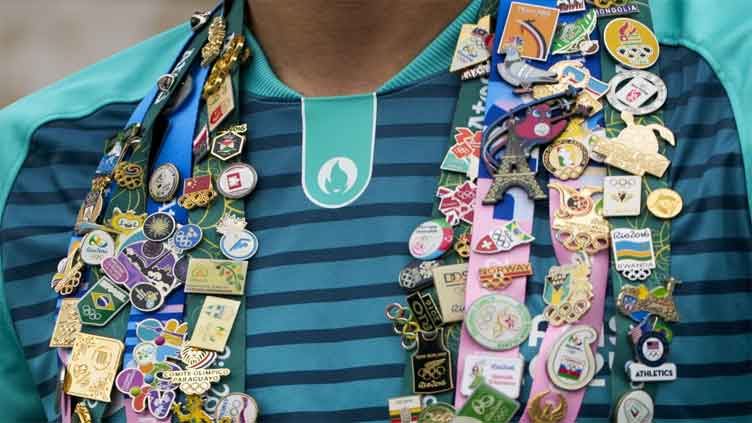A look at inside the pin-trading market at Paris Olympics

WeirdNews
A look at inside the pin-trading market at Paris Olympics
PARIS (AP) — On the other side of the Atlantic, a market has sprung up at the Paris Olympics.
The commodity at the center of it all? Pins and that's all.
The city has seen an influx of collectors from all over the world, each eager to begin or expand their Olympic pin collection and share their stories.
“People are wired to trade. Human beings, we want to trade,” asserts Craig Robbins, a passionate pin collector from Los Angeles. “In life, if you cannot exchange, you die.”
“Do you have any pins?” a Starbucks barista asks every journalist who comes in for coffee at the Palais des Congrès, the Olympics’ main press center.
From bustling coffee shops to quiet streets, the same question has been echoing all over town, as Olympic volunteers, athletes, media workers, waiters, tourists and more all look for the same prized accessories.
“You can really feel the craze this year,” says French pin collector Laurent Facy.
The quest for pins has become an integral part of the Olympics, adding another layer of excitement to the Games. “It’s become a game; we trade a little bit like we used to at the playground,” he says.
The tradition can be traced back to the first modern Olympic Games, revived by Pierre de Coubertin in 1896. In Athens, little cardboard badges were sported by athletes, coaches and reporters for identification.
More than a century on, the badges have stretched and evolved into extremely detailed, intricate and, at times, technological pins, customized to participating countries, news organizations, brands and even people.
“They’re like little pieces of art,” passionately declares Nicholas Wolaver, a dedicated American collector and trader.
Los Angeles 1984 was pivotal, according to the many pin traders on the streets — that’s where many of them started collecting.
“You had media pins, sponsor pins, athlete pins, mascot pins. They found a way to really monetize pins for the public, and people were going crazy,” Wolaver says of those Games.
The Paris 2024 pins
After two Olympics held without spectators amid the coronavirus pandemic, the pin pandemonium has resurged.
“Paris has been very good for pin collecting because after the pandemic, where you could not trade pins so much in Tokyo and Beijing, people are very excited,” Wolaver explains.
The pins’ popularity has been boosted by social media and the fact that Olympians themselves are getting in on the game.
Serena Williams, a former Olympian, described herself as a “first-class pin collector” in a video on the Olympics’ official Instagram account. She even has her favorites: “There’s a few Thailand ones I’ll never trade. I finally was able to nab the North Korean pin.”


